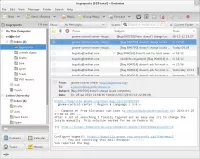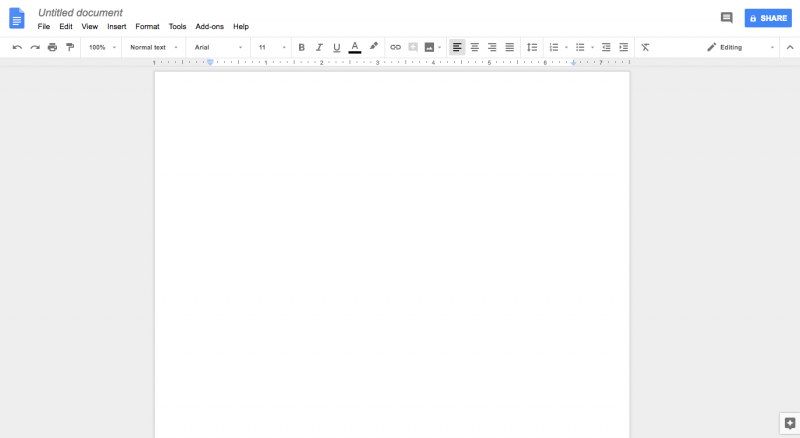Google Docs is a free, web-based word processor offered by Google as part of the Google Docs Editors suite. It is accessible through web browsers, mobile apps (Android and iOS), and as a desktop application on ChromeOS. It allows users to create, edit, and collaborate on documents online in real-time. Key features include version history, offline access, and integration with other Google services like Google Drive. It supports various file formats and offers features similar to traditional desktop word processors.
August 2005: Writely Launched
In August 2005, Upstartle launched Writely, a web-based word processor which was the origin of Google Docs. It was created as an experiment by programmers using Ajax technology and the 'contentEditable' HTML feature.
March 9, 2006: Google Acquires Upstartle
On March 9, 2006, Google announced its acquisition of Upstartle, the company behind Writely.
October 10, 2006: Google Documents Release
On October 10, 2006, Google released Google Documents, a new product based on Writely.
July 2009: Google Docs Leaves Beta
In July 2009, Google officially dropped the beta testing status from Google Docs, marking a significant milestone in its development.
March 2010: Google Acquires DocVerse
In March 2010, Google acquired DocVerse, an online document collaboration company, enhancing Google Docs' capabilities.
April 2010: Improvements Based on DocVerse Deployed
In April 2010, improvements based on the DocVerse acquisition were announced and deployed, enhancing the collaboration features of Google Docs.
October 2011: Security Researchers Raised Issues About Threat
In October 2011, at least three security researchers raised issues about the Google Docs threat.
June 2012: Google Acquires Quickoffice
In June 2012, Google acquired Quickoffice, a freeware productivity suite for mobile devices, further expanding its mobile capabilities.
October 2012: Google Documents Renamed to Google Docs
In October 2012, Google renamed Google Documents to Google Docs and released Chrome App versions of Google Docs, Sheets, and Slides.
2012: Basic Research Tool Introduced
In 2012, a basic research tool was introduced in Google Docs, enhancing the document creation process.
April 2013: Google Cloud Connect Discontinued
In April 2013, Google Cloud Connect was discontinued, as Google Drive achieved the same tasks with better results.
March 2014: Add-ons Introduced
In March 2014, Google introduced add-ons, new tools from third-party developers that add more features to Google Docs.
June 2014: "Suggested Edits" Introduced
In June 2014, Google introduced "Suggested edits" in Google Docs, allowing users to suggest edits that the author can accept or reject.
June 2014: Dedicated Website Homepage Rolled Out
In June 2014, Google rolled out a dedicated website homepage for Google Docs, containing only files created with the service.
2015: Mobile Website Updated
In 2015, the mobile website for Google Docs was updated with a 'simpler, more uniform' interface, preventing editing on the mobile web.
September 2016: "Explore" Expanded with Machine Learning
In September 2016, the basic research tool was expanded into "Explore", adding additional functionality through machine learning in Google Docs.
October 2016: "Action Items" Announced
In October 2016, Google announced "Action items" for Docs, intelligently assigning tasks to users based on phrases in the document.
December 2016: Quick Citations Feature Introduced
In December 2016, Google introduced a quick citations feature to Google Docs, allowing users to insert citations as footnotes with the click of a button.
December 2016: PC Magazine Review
In a December 2016 review, PC Magazine noted that the suite was "visually elegant" with "effortless collaboration", but that Docs, as paired with Sheets and Slides, was "less powerful than desktop-based suites".
May 2017: Phishing Attack Impersonating Google Docs
In May 2017, a widespread phishing attack impersonated a Google Docs sharing email, tricking users into granting access to a malicious third-party app.
October 2017: Incorrect Flagging of Documents
In October 2017, Google released a server-side update that incorrectly flagged random documents as unspecified violations of its 'Terms of Service' policies.
February 2019: Grammar Suggestions Introduced
In February 2019, Google introduced grammar suggestions in Docs, expanding its spell check using machine translation techniques to catch grammatical errors.
January 2022: Text Watermark Feature Announced
In January 2022, Google announced the text watermark feature for Google Docs, allowing users to create or import watermarks to a document.
March 2022: Markdown Detection Added as Opt-In Feature
In March 2022, Google added an opt-in feature to automatically detect Markdown within Google Docs.
2023: New UI Theme Introduced
In March of 2023, Google Docs, along with Slides and Sheets, introduced a new UI theme, updating the user experience.
July 2024: Google Docs to Fully Support Markdown Syntax
In July 2024, Google announced that Google Docs would begin fully supporting Markdown syntax.
Mentioned in this timeline

Google LLC is a multinational technology company specializing in online...

Microsoft an American multinational technology corporation headquartered in Redmond Washington...

Electronic mail or email revolutionized communication by providing a digital...

September is the ninth month of the year in the...
Trending

9 months ago Paolo Banchero's NBA Journey: Overcoming Injury, Praising Teammates, and Hope for the Future

2 months ago Hornets considering trading Miles Bridges after Bulls loss in NBA Cup game.

4 months ago William Shatner Revisits 'Star Trek,' Addresses Fans, and Returns as Captain Kirk in Comics.

4 months ago Kyle Kuzma Suffers Injury in Bucks-Raptors Game; Update Released
11 months ago Latvia Imposes Entry Ban on Citizens from Russia and Belarus Amid Tensions
4 months ago Daytona 500 Date Announced for 2027, Creates Fan Uproar Over Scheduling Conflicts
Popular

Kid Rock born Robert James Ritchie is an American musician...
The Winter Olympic Games a major international multi-sport event held...

XXXTentacion born Jahseh Dwayne Ricardo Onfroy was a controversial yet...

Barack Obama the th U S President - was the...

Melania Trump a Slovenian-American former model has served as First...

Billie Eilish is a prominent American singer-songwriter who rose to...
